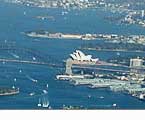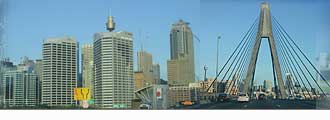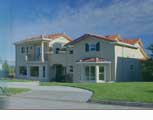



| |
 |
 |
 |
|
Come visit frequently this page - industry news, property and investment related articles and miscelaneous useful info will wait for you here.
* * *Things to consider before refinancing your mortgage 1.Refinancing goals.
Refinancing your home loan can be one way of taking control of your debt to make savings or grow wealth. But there are many things you need to weigh up before you take the leap. Ask yourself:
Having a clear understanding of what you hope to achieve by refinancing can help you make a better decision. 2. Costs to refinance a mortgage The numerous costs of refinancing a home loan can sometimes set you back thousands, leaving you wondering whether it was worth it. To avoid any nasty surprises, look at the terms and conditions of both your existing home loan and the loan you are looking to refinance with to discover what the "change" costs will be, including discharge fees, valuation fees, break costs, etc. If you're refinancing to get a lower interest rate, you should first calculate how much less you'll pay in interest at that rate (you can do this using our home loan repayments calculator) and compare this saving to the total cost of refinancing. That should give you an idea of whether the refinance is worth it. You may find that through the interest savings, you'll make back the refinancing costs within a year. If it's going to take a several years to recoup the cost of switching, you may need to consider other options. 3. Property value & your equity Whether you're refinancing to secure a lower interest rate or to free up some cash from your home loan, you need to consider the current value of your property and how much equity you have in it. You can use loan-to-value ratio (LVR) as a measure of equity. This is expressed as a percentage. So, if your home is worth $700,000 and you owe $350,000 on your home loan, your loan-to-value ratio is 50%. As property prices rise (as they tend to do over the long term), the equity in your home can also rise. You may have started out with a standard loan-to-value ratio of 80%, purchasing your property for $500,000 with a $100,000 (20%) deposit and a $400,000 home loan. A rise in your property value, along with reducing the amount you owe on your loan, will naturally increase the equity you have - in this case from 20% to 50%. At the same time, your loan-to-value ratio has reduced from 80% to 50%. When refinancing to get a cheaper interest rate, a lower LVR will generally stand you in good stead. But if you're looking to refinance with an LVR higher than 80%, you may struggle to qualify for the lowest interest rates on the market. If you're seeking to refinance with another lender, you may also face having to pay for Lenders Mortgage Insurance (LMI) - even if you already paid for it when you took out your original loan. When refinancing to access some of your equity (for example, to pay for a renovation or to invest it in another property), you'll generally be able to borrow up to 80% of the property's value minus the outstanding debt. So, if your property is worth $700,000, you would be able to borrow 80% of that, or $560,000, less the amount you owe on your loan, $350,000. That's $210,000 in equity freed up from your home loan which could go some way for paying for renovations or another property. Borrowing any more than that would push your loan-to-value ratio beyond 80% LVR which many lenders may not be comfortable with. But lenders' policies vary considerably. If you're looking to refinance, it pays to shop around for a lender that best meets your needs and circumstances. 4. Credit rating Have you checked your credit rating recently? If it's not so great, you might find it working against your efforts to refinance. Also, refinancing represents an application for credit, which also appears on your credit report and can influence your credit score. Lenders can be wary of those who refinance too often, so having numerous mortgage refinances on your credit report can affect your interest rate bargaining power or indeed your eligibility to refinance. 5. Current home loan interest rates It pays to be across what interest rates are doing in the home loan market and what a variety of experts are predicting. If interest rates are expected to rise over the next few years, you might want to consider refinancing to a fixed rate 6. Honeymoon rates (or introductory rates) Sometimes you can be lured to refinance your loan by an eye-catching introductory or honeymoon rate. This is an interest rate you will be paying for a specified period before the rate reverts to another (often higher) rate. If that's the case, make sure you are clear on what interest rate the loan will revert to at the end of the introductory period which can generally be between six months and two years. You should also consider this for interest-only and fixed rate home loans. What will the rate revert to after the interest-only or fixed-rate period has passed? Sometimes it's impossible to know what an exact variable rate will be over a longer time. In worst case scenarios, borrowers can face the risk of being stuck with a high revert rate and unable to refinance to another lender.This could be because a lender's lending criteria has tightened, the borrower's credit score has worsened, or their property value has dipped (property values don't always rise in a linear fashion), effectively raising their loan-to-value ratio (LVR). 7. Loan features A loan with a lower rate doesn't necessarily represent the "best value". When refinancing to find a better deal, consider useful home loan features such as a redraw facility or an offset account. These features, used effectively, can save you much more on the overall cost of your home loan than a lower interest rate alone. 8.Debt consolidation If you have significant debts outside your mortgage, such as a car loan, personal loan, or credit card debts, you could consider consolidating these into your mortgage when refinancing. This can make it easier to manage your debts because you're repaying them all through the one regular repayment (weekly, fortnightly or monthly). The consolidated debts will revert to the interest rate of your home loan, which may be significantly lower than the interest rates you were paying when they were standalone debts. Credit cards can have interest rates of more than 20% p.a. However, beware, because of the longer term of a home loan, the total interest payable for the consolidated debts may work out to be higher. Again, you'll need to do your calculations and consider what best suits your long-term goals. * * * |